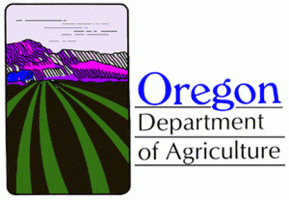BLOCK GRANTS HELP OREGON AGRICULTURE
October 12, 2011… The Oregon Department of Agriculture has awarded more than $1.7 million in federal funds to 24 projects aimed at boosting the competitiveness of the state’s fruits, vegetables, tree nuts, and nursery products. This month’s announcement regarding the Specialty Crop Block Grant Program is good news for all states, but Oregon is especially happy to receive the funds.
“A majority of our agricultural production comes from specialty crops,” says ODA Director Katy Coba. “These projects will help our diverse array of growers and producers address their top priorities. The grant program has been good to Oregon, and the dollars it provides have funded many successful projects in the past. I’m excited about this year’s projects.”
PROGRAM IMPACT TOUCHES ENTIRE UNITED STATES
The impact of the program spans the entire United States and its territories.
“Agriculture plays a vital role in the health and strength of our economy, and by investing in specialty crop growers and producers across the country, we can help spark new markets and job creation while expanding production of healthy, safe, and affordable food,” says Deputy Secretary Kathleen Merrigan of the US Department of Agriculture.
Oregon ranks fifth in the nation in production of specialty crops. Most federal appropriations in the past have been directed to large program crops primarily grown in the Midwest and South, such as wheat, corn, soybeans, and cotton. Recent Farm Bills have attempted to provide more attention– and dollars– to specialty crops. Each state receives a base amount under the USDA’s Specialty Crop Block Grant Program, but additional funds are awarded to states in proportion to the percentage of specialty crops they produce. Oregon’s amount this year is slightly lower than in 2010.
Since last year, ODA has conducted extensive outreach to groups and organizations in an effort to attract more grant proposals. Six statewide grant trainings were held over the winter. The outreach paid off with an impressive list of first time participants in the specialty crop grant process. Of the 54 applications received for this year’s funding, 26 were new to the program.
“We were absolutely thrilled with the depth and breadth of the project proposals we saw,” says Katie Pearmine, ODA’s Specialty Crop Grant Program Coordinator. “We saw proposals that ranged from supporting local growers to gaining access into Asian markets. It’s exciting to see the increased interest.”
Once again, an industry advisory board helped select the final list of grant recipients. In evaluating the proposals, emphasis was placed on producer and consumer outreach, market development and access to local and export markets, value-added initiatives, food safety, and traceability/certification.
INTEREST IN THE ASIAN EXPORT MARKET
A variety of groups being funded are specifically interested in accessing the Asian export market.
“As we’ve seen from the recent governor’s trade mission to Asia, there is a strong demand for many of Oregon’s specialty crops– especially Oregon berries,” says Pearmine. “We are funding a project that works to help cranberry growers on the southern Oregon coast reach markets in China. We are also funding a project with the Oregon Raspberry and Blackberry Commission to increase the promotion of Oregon’s individually quick frozen, dried, and canned berries in both foreign and domestic food service markets.”
The Curry Soil and Water Conservation District is receiving $90,000 to manage the cranberry export project. The Oregon Raspberry and Blackberry Commission is receiving $53,362 to oversee the industry’s promotional campaign. Another export related project is a $91,900 grant to Certified Onions, Inc. to promote a voluntary food safety testing program used by about 90 percent of the Treasure Valley’s onion growers in Eastern Oregon. Certified Onion received a grant last year to expand the testing and certification program.
LOCAL AGRICULTURAL CONCENTRACTION
Other projects concentrate more on local agriculture and its issues.
“We received many more applications from groups that work to help beginning farmers or serve socially disadvantaged growers in many regions throughout the state,” says Pearmine.
Among the awards is a $45,200 grant to Adelante Mujeras, a Forest Grove-based organization, to help low-income Latino producers reach consumers through the Forest Grove Farmers’ Market. Another regional effort is a project by the Gorge Grown Food Network, which is receiving $23,448 to provide vegetable growers in the Columbia Gorge with hands-on classes and workshops to help them lengthen the growing season. In Southern Oregon, a group called THRIVE will connect consumers with beginning growers in the area through targeted education and outreach centering on a new online farmers’ market, thanks to a grant of $51,786.
For the first time, an agricultural distributor will receive specialty crop grant funds in Oregon.
“We are excited to see a project from Organically Grown Company, which will offer growers trainings, guidance, and third-party food safety certification,” says Pearmine. “It’s great to see a distributor working directly with growers to address food safety issues.”
Organically Grown, which is receiving a $69,564 grant, claims to be the Pacific Northwest’s largest wholesaler of organic produce. It has operations in Eugene and Portland.
Other projects in this year’s group deal with such issues as getting more local foods into schools, expanding markets for Community Supported Agriculture (CSAs), and warehouse fumigation research for Oregon grass seed growers.
All in all, the specialty crop grant funding is more than welcome and hopefully it will continue for years.
“These dollars are vital for our specialty crop growers in Oregon,” says Pearmine. “The funding allows us to better support our growers and keep them competitive in the marketplace.”
Additional Information
For a list of all funded projects, go to http://oregon.gov/ODA/docs/pdf/project_summary_FY2011.pdf.
For more information, contact Katie Pearmine at (503) 872-6600.
For an audio version of this story, please go to http://oregon.gov/ODA/news/111012specialty_audio.shtml

